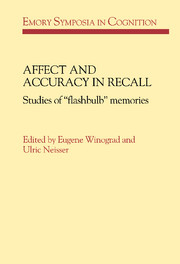Book contents
- Frontmatter
- Contents
- Preface
- List of contributors
- 1 Introduction
- Part I Empirical studies
- 2 Phantom flashbulbs: False recollections of hearing the news about Challenger
- 3 Potential flashbulbs: Memories of ordinary news as the baseline
- 4 Flashbulb memories: Confidence, consistency, and quantity
- Part II Developmental studies
- Part III Emotion and memory
- Part IV Theoretical issues
- Author index
- Subject index
4 - Flashbulb memories: Confidence, consistency, and quantity
Published online by Cambridge University Press: 22 March 2010
- Frontmatter
- Contents
- Preface
- List of contributors
- 1 Introduction
- Part I Empirical studies
- 2 Phantom flashbulbs: False recollections of hearing the news about Challenger
- 3 Potential flashbulbs: Memories of ordinary news as the baseline
- 4 Flashbulb memories: Confidence, consistency, and quantity
- Part II Developmental studies
- Part III Emotion and memory
- Part IV Theoretical issues
- Author index
- Subject index
Summary
The event
On January 28, 1986 at 11:38 a.m. EST, the Space Shuttle Challenger rose into the sky on a pillar of fire. It carried five men and two women aloft, including the first black astronaut, and the first teacher to go into space, Christa McAuliffe. Approximately 72 seconds into the flight, shortly after the astronauts had received and acknowledged the command to go to full throttle, the main external fuel tank exploded. The Challenger disintegrated, killing all on board before the horrified eyes of millions. A high-level executive for Morton-Thiokol, the company that made the solid rocket boosters, watched the vapor trail from the moment of launch and knew something was wrong. After the explosion the booster engines continued to burn and flew off on tangential trajectories. Ironically, his first thought was that at least the boosters that his company manufactured had performed well. He remembered wondering who was going to head the disaster investigation and who was to blame. Shortly thereafter, he was to receive another shock. The booster rockets were responsible for the explosion, and his company's executive decisions were shown to have been determined by expediency and characterized by a blatant disregard for safety.
If the man in question had been only one out of a few people with unusual memories for their personal discoveries of the Challenger disaster, there would be no reason for this book.
- Type
- Chapter
- Information
- Affect and Accuracy in RecallStudies of 'Flashbulb' Memories, pp. 65 - 92Publisher: Cambridge University PressPrint publication year: 1992
- 66
- Cited by



